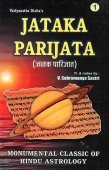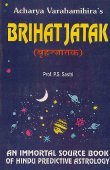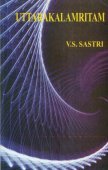Brihajjataka, Brihaj-jataka, Brihat-jataka, Bṛhajjātaka, Brihagjataka: 6 definitions
Introduction:
Brihajjataka means something in Hinduism, Sanskrit. If you want to know the exact meaning, history, etymology or English translation of this term then check out the descriptions on this page. Add your comment or reference to a book if you want to contribute to this summary article.
The Sanskrit term Bṛhajjātaka can be transliterated into English as Brhajjataka or Brihajjataka, using the IAST transliteration scheme (?).
In Hinduism
Jyotisha (astronomy and astrology)
Source: Wikipedia: Jyotisha (astronomy)Bṛhajjātaka (बृहज्जातक) is one of the five principal texts written by Vārāhamihira (6th century AD) and is considered as the standard textbook on Vedic astrology, and sometimes described as "India's foremost astrological text". The original text, written in chaste Sanskrit, consists of more than 407 ślokas or verses that comprise 28 chapters.

Jyotisha (ज्योतिष, jyotiṣa or jyotish) refers to ‘astronomy’ or “Vedic astrology” and represents the fifth of the six Vedangas (additional sciences to be studied along with the Vedas). Jyotisha concerns itself with the study and prediction of the movements of celestial bodies, in order to calculate the auspicious time for rituals and ceremonies.
Languages of India and abroad
Sanskrit dictionary
Source: Cologne Digital Sanskrit Dictionaries: Cappeller Sanskrit-English DictionaryBṛhajjātaka (बृहज्जातक).—[neuter] T. of a work.
Source: Cologne Digital Sanskrit Dictionaries: Aufrecht Catalogus Catalogorum1) Bṛhajjātaka (बृहज्जातक) as mentioned in Aufrecht’s Catalogus Catalogorum:—astrol. by Varāhamihira. W. p. 254. Oxf. 328^b. 329^a. L. 1376. 2453. K. 234. B. 4, 164. 166. Ben. 25. Kāṭm. 10 (and—[commentary]). Pheh. 7. 10. Rādh. 36. NW. 544. Oudh. Xiv, 48. Burnell. 77^b. Bhk. 34. Bhr. 341. 343. Poona. 277. 278. H. 306-8. Taylor. 1, 8. Oppert. 573. 779. 1011. 1286. 1695. 2524. 4530. 6618. 6951. 7109. 7615. Ii, 552. 1118. 1343. 1638. 1987. 2342. 2604. 2896. 3208. 3312. 4752. 7653. 8058. 8283. 10158. Rice. 32. Cambay p. 87. See Laghujātaka.
—[commentary] Khn. 90. B. 4, 166. Np. Ix, 48. Oppert. 2913. Ii, 4087. 6348. 9730.
—[commentary] Gaṇitakalpadruma. Np. X, 52.
—[commentary] Daśādhyāyī or Naukā. Np. Vii, 36. Ix, 46. X, 52. Sb. 272.
—[commentary] Subodhinī. Burnell. 77^b.
—[commentary] Jagaccandrikā, or rather Cintāmaṇi, composed by Bhaṭṭotpala in 966. Io. 435. Oxf. 329^a. L. 759. K. 234. B. 4, 166. Ben. 31. Pheh. 10. Rādh. 36. Np. I, 146. 154. Ii, 114. Bhk. 34. Poona. 278. 279. H. 308. Oppert. 1231. 3559. 8115. Ii, 1837. 4753. Peters. 1, 119. 2, 195.
—[commentary] Bṛhajjātakaprakāśa by Mahādeva. Bik. 301.
—[commentary] by Mahīdhara. L. 2453. B. 4, 166. Ben. 25. Oudh. Iii, 14. Ix, 10. Xiii, 62. Xix, 66. Np. I, 146. Ii, 114. Vii, 36. Bhr. 342. 343. Peters. 2, 195.
—[commentary] by Viśvanātha. Oudh. Iv, 13. Bṛhajjātake Naṣṭajātakādhyāyaṭīkā by Balabhadra P. 14.
—Horāsāra (?). [Mackenzie Collection] 123.
2) Bṛhajjātaka (बृहज्जातक):—by Rāmahari. Proceed. Asb. 1865, 138.
3) Bṛhajjātaka (बृहज्जातक):—by Varāhamihira. Io. 834. 2520 (inc.). Oudh. Xx, 104. 132. Peters. 4, 36 (and—[commentary]). Stein 167.
—[commentary] Daśādhyāyī. Peters. 4, 39.
—[commentary] Jagaccandrikā by Bhaṭṭotpala. Hz. 557. Oudh. Xx, 126. 134. Peters. 4, 36. Stein 167.
—[commentary] by Mahīdhara. Oudh. Xx, 114. 120. Xxii, 82. Peters. 4, 36.
—[commentary] by Viśvanātha. Oudh. Xxi, 84.
—[commentary] by Śrīpati Bhaṭṭa. Gov. Or. Libr. Madras 58.
4) Bṛhajjātaka (बृहज्जातक):—by Varāhamihira. Ulwar 1872.
—[commentary] Subodhinī. Ulwar 1874. Extr. 531.
—[commentary] by Bhaṭṭotpala. Ulwar 1872.
—[commentary] by Mahīdhara. Ulwar 1873.
5) Bṛhajjātaka (बृहज्जातक):—by Varāhamihira. As p. 118. Bd. 872. L.. 989. 990 (up to the end of the eighth Adhyāya). 991 ([fragmentary]). Peters. 5, 522. 6, 427. Whish 110 A 1. (2-25). C. Naukā or Horāvivaraṇa. Whish 115, 1. C. Subodhinī. Whish 110 A 1 (2-25). 169, 4 (breaks off in the beginning of the second Adhyāya). C. by Bhaṭṭotpala. As p. 118. Bd. 872. L.. 989 (from 6, 11). 990 (up to the end of the eighth Adhyāya). 991 ([fragmentary]). Śg. 2, 190. C. by Mahīdhara. Ak 882. L.. 992 (1-18). Peters. 6, 427.
Source: Cologne Digital Sanskrit Dictionaries: Monier-Williams Sanskrit-English Dictionary1) Bṛhajjātaka (बृहज्जातक):—[=bṛhaj-jātaka] [from bṛhaj > bṛṃh] n. Name of Varāhamihira’s larger [work] on nativities (cf. svaipa-jātaka)
2) [v.s. ...] of another [work]
[Sanskrit to German]
Sanskrit, also spelled संस्कृतम् (saṃskṛtam), is an ancient language of India commonly seen as the grandmother of the Indo-European language family (even English!). Closely allied with Prakrit and Pali, Sanskrit is more exhaustive in both grammar and terms and has the most extensive collection of literature in the world, greatly surpassing its sister-languages Greek and Latin.
See also (Relevant definitions)
Partial matches: Brihaj, Brihat, Jataka.
Starts with: Brihajjatakashlokavyakhyana.
Full-text (+4735): Brihajjatakashlokavyakhyana, Varahamihira, Shashankasuta, Tuhinakirana, Timiranayana, Cipitasya, Juka, Tamasika, Taukshika, Kumudakarabandhava, Udayarashi, Khayoga, Mrigeshvara, Shadvarga, Shaktipurva, Amarejya, Daridrya, Ushesha, Kshitisuta, Prithuyashas.
Relevant text
Search found 9 books and stories containing Brihajjataka, Brihaj-jataka, Brihat-jataka, Bṛhajjātaka, Brihagjataka, Bṛhat-jātaka, Brhajjataka, Brhat-jataka, Bṛhaj-jātaka, Brhaj-jataka, Bṛhagjātaka, Brhagjataka; (plurals include: Brihajjatakas, jatakas, Bṛhajjātakas, Brihagjatakas, jātakas, Brhajjatakas, Bṛhagjātakas, Brhagjatakas). You can also click to the full overview containing English textual excerpts. Below are direct links for the most relevant articles:
Karmic Astrology—a Study (by Sunita Anant Chavan)
Part 2.2.10 - Horā period of Jyotiḥśāstra (Introduction) < [Chapter 2 - Jyotiḥśāstra and the Concept of Karman]
Part 2.1.5 - Concept of Graha (Planet) < [Chapter 2 - Jyotiḥśāstra and the Concept of Karman]
Part 5.4 - Correlation of Jyotiṣa and Karma in the Varāha period < [Chapter 3 - Development of Jyotiḥśāstra and Karman in the Literature]
Significance of the Moon in Ancient Civilizations (by Radhakrishnan. P)
12. Astrologial overview on Moon in Zodiac Signs < [Chapter 5 - Adoration of the Sun and Moon]
4. Horoscope Analsys (Walking Abnormalities) < [Chapter 14 - Case Studies of Natal Chart]
1. Horosope Analysis Akhilesh Yadav < [Chapter 14 - Case Studies of Natal Chart]
Brihat Samhita (by N. Chidambaram Iyer)
Appendix 7 - The five elementary principles that compose the physical man
Chapter 78 - On Sexual Union (puṃstrī-samāyoga)
Chapter 101 - On the effects of birth in the Asterisms (nakṣatra-jātaka)
Atharvaveda and Charaka Samhita (by Laxmi Maji)
Varāhamihira (Āyurveda scholar) < [Chapter 1 - Introduction]
Lakulisha-Pashupata (Philosophy and Practice) (by Geetika Kaw Kher)
Kapalikas and the cult of body < [Chapter 2 - Spread and Transition]
Evidence of Ajivika cult in Kashmir < [Chapter 2 - Spread and Transition]
History of Indian Medicine (and Ayurveda) (by Shree Gulabkunverba Ayurvedic Society)
Chapter 15 - Kampilya as a Centre of Learning < [Part 4 - Some Aspects of Life in Caraka’s Times]
Chapter 6 - The Story of Caraka < [Part 1 - The History of Medicine in India]
Related products



